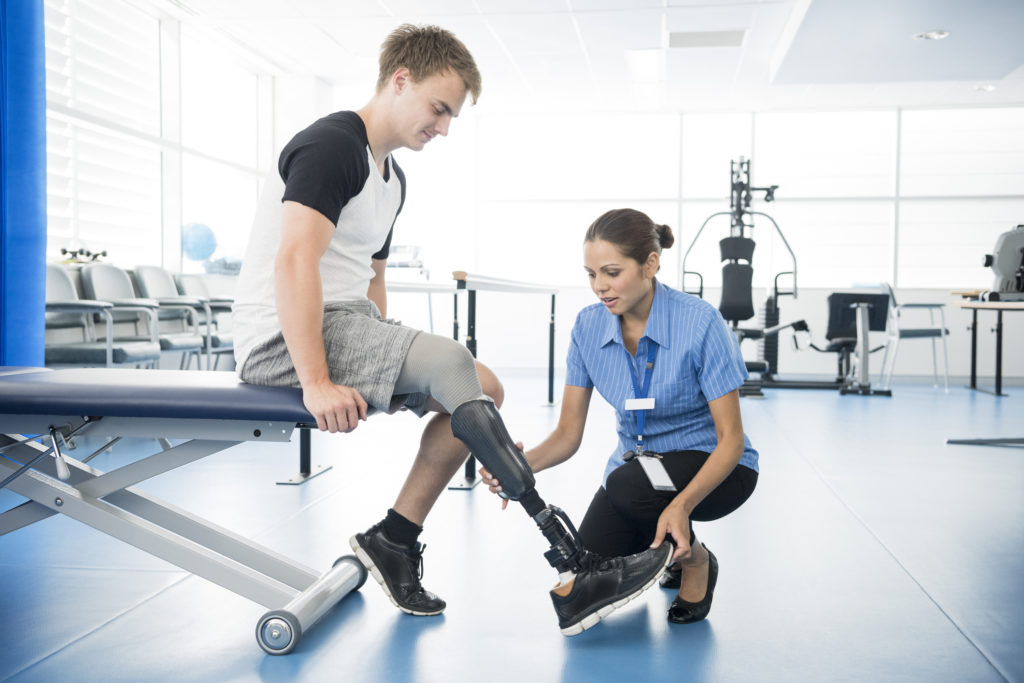
More than 2 million people in the United States have lost a limb – 45 percent of those through trauma such as a vehicle collision or workplace accident.
The immediate psychological and financial toll of having a leg, arm or finger(s) amputated – including ambulance fees, surgical expenses, a prosthetic, pain and suffering – is extremely high. But many people are unaware of the lifetime costs associated with an amputation. These costs can present an enormous financial burden to amputees and their families.
That’s why it’s crucial to consult with an experienced personal injury attorney if you have suffered an amputation due to someone else’s negligence. You may be entitled to extensive compensation. Let’s look at some of the costs and complications involved in amputation cases.
Prosthetics
A prosthetic leg can cost between $5,000 and $50,000. But that’s not a one-time expense. Amputees usually receive a temporary prosthesis shortly following surgery. Then, after the limb heals and the swelling abates, patients receive a new prosthesis several months later. After that, amputees must replace their prosthetics at least every five years due to wear and tear. Private insurance companies typically don’t cover the complete cost of a prosthesis.
Wheelchairs and adjustments to the home
Some amputees may have to use a wheelchair, which is not only costly in itself but often requires remodeling your home to make it accessible. You may find it necessary to install ramps and lifts, widen doors and entryways, and lower counters. You may also have to retrofit a vehicle with a lift or hand controls.
Physical, occupational and psychological therapy
Amputees face a long road of rehabilitation that may include:
• Exercises to strengthen muscles that must take over for the missing limb, as well as exercises to increase balance, coordination and endurance.
• Flexibility-boosting stretches to prevent contractures (tightness in the connective tissues that limits joint motion).
• Pain management, which might include gentle electrical stimulation of the skin, biofeedback, desensitization through various forms of touch, and pain-relieving drugs.
• Mastering the use of a wheelchair, walker or other assistive devices.
• Training in the use of a prosthesis. This can be an agonizingly challenging endeavor, particularly with a prosthetic hand. You must train your mind to consciously execute complex actions that were once effortlessly unconscious.
• Re-learning to drive a vehicle with a prosthetic or hand-controls.
The life-altering consequences of losing a leg, hand or finger(s) can also take a huge toll on your mental health. Many patients suffer from depression due to the enormous lifestyle upheavals and loss of independence or abilities. Physical and occupational therapy can be stressful and frustrating. If the amputation was the result of a traumatic accident, amputees can also suffer from PTSD. Psychological therapy can be invaluable in building the mental strength to face these daily challenges.
Pain and suffering
In addition to the pain experienced with any severe injury, nearly two-thirds of amputees suffer from chronic phantom limb pain. This somewhat mysterious phenomenon is caused when the brain and spinal cord, confused by the lack of sensory input from the missing limb or organ, communicates that something is wrong by sending a message of pain. The brain can also remap its nerve circuitry so that functioning areas of the body start sending sensations that feel like they’re coming from the missing organ. So, for example, if someone touches the amputee’s face, the nerves in his or her cheek would send messages to the part of the brain that registers pain in the missing organ.
Phantom pain can take the form of a deep throbbing, a sensation of heat or cold, or a feeling that the muscles are cramped. The pain can be mild or extreme and can last anywhere from a few months to a lifetime.
Effectively treating phantom limb pain is challenging and often requires trial and error. Some patients have success with physical therapy, biofeedback, nerve stimulation, and/or pain-relieving drugs.
Lost wages
Depending on the severity of the injury, amputees may be unable to return to work for several months. If the occupation requires specific physical activities the amputee is no longer able to perform, he or she may not be able to return to that career.
Your legal claim
Clearly, the costs associated with an amputation are varied, extensive, and can last a lifetime. If the amputation was the result of someone else’s negligence, you may be entitled to damages including lost wages, medical bills, pain and suffering, and more.
Because of the complex nature of amputation cases, it is difficult to estimate how much each claim might be worth. An experienced personal injury attorney can help you get the most compensation in your case by demonstrating the full impact of the amputation and all the costs you will face.
The Lamber-Goodnow Personal Injury team offers free consultations for amputation victims. We don’t get paid until you get paid.
#KC
